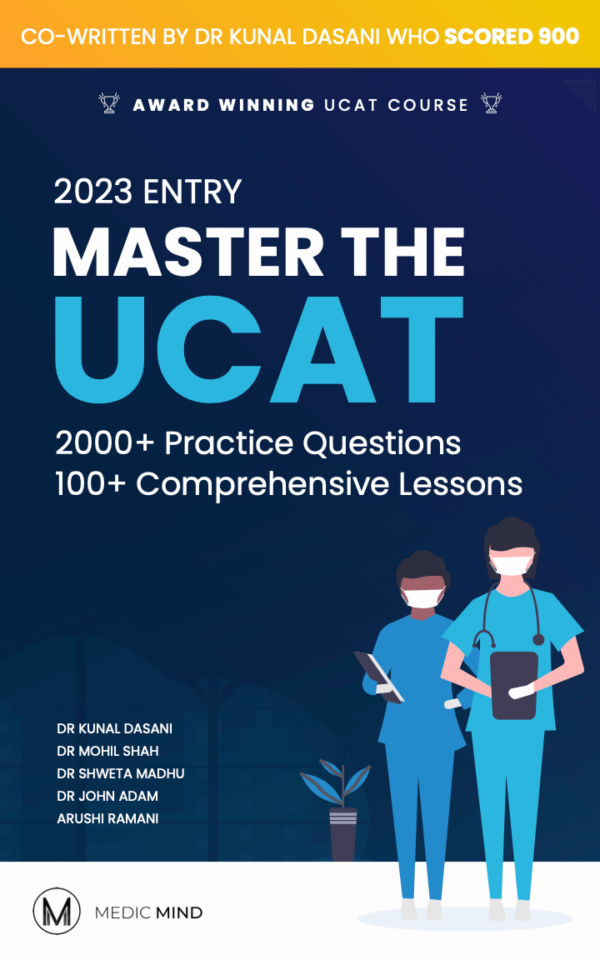Loading...

UCATSEN 2023
What is the UCATSEN?
UCATSEN is the term used for the UCAT exam for students with specific learning difficulties or disabilities, such as dyslexia. Those with specific medical conditions or temporary injury are also entitled. In UCATSEN, you may be allowed extra time, rest breaks or accommodations according to your needs.
There are several formats of the UCATSEN which are assigned to candidates based on individual requirements.

How much extra time do I get in UCATSEN?
The short answer is that it depends! Here is a short breakdown of the possible timings you may be awarded:
- UCATSA: standard UCAT exam with additional rest breaks, up to 140 minutes total including 20 minutes of “stop-the-clock” breaks
- UCASEN: for candidates with 25% extra time, up to 150 minutes
- UCATSENSA: for candidates with 25% extra time and additional rest breaks, up to 175 minutes
- UCATSEN50: for candidates with 50% extra time, up to 180 minutes
UCAT – Standard exam timings:
| Exam Section | Instructions | Exam |
|---|---|---|
| Verbal Reasoning | 1 minute | 21 minutes |
| Decision Making | 1 minute | 31 minutes |
| Quantitative Reasoning | 1 minute | 25 minutes |
| Abstract Reasoning | 1 minute | 12 minutes |
| Situational Judgement | 1 minute | 26 minutes |

UCATSEN – 25% extra time:
| Exam Section | Instructions | Exam |
|---|---|---|
| Verbal Reasoning | 1 minute 15 seconds | 26 minutes 15 seconds |
| Decision Making | 1 minute 15 seconds | 38 minutes 45 seconds |
| Quantitative Reasoning | 1 minute 15 seconds | 31 minutes 15 seconds |
| Abstract Reasoning | 1 minute 15 seconds | 15 minutes |
| Situational Judgement | 1 minute 15 seconds | 32 minutes 30 seconds |
UCATSEN50 – 50% extra time:
| Exam Section | Instruction | Exam |
|---|---|---|
| Verbal Reasoning | 1 minute 30 seconds | 31 minutes 30 seconds |
| Decision Making | 1 minute 30 seconds | 46 minutes 30 seconds |
| Quantitative Reasoning | 1 minute 30 seconds | 37 minutes 30 seconds |
| Abstract Reasoning | 1 minute 30 seconds | 18 minutes |
| Situational Judgement | 1 minute 30 seconds | 39 minutes |
Am I at a disadvantage sitting the UCATSEN instead of UCAT?
No! Just like how getting extra time in exams at school doesn’t disadvantage you in any way, with university applications the UCATSEN will not affect the way universities consider you. Medical schools won’t even know that you sat the UCATSEN rather than the standard UCAT.
It is important that when applying to medical school when asked, you disclose any specific learning difficulties or disabilities so that the university can make sure they are supporting you in your education and application as best they can. You may be surprised that it is estimated up to 10% of medical students have specific learning difficulties, with a proportion only being diagnosed while at medical school. It’s not something to worry about when applying to medical school, and definitely not something that should put you off.
Boost your UCAT Score with our Expert Tutors!
Top tips for preparing for the UCATSEN
We’ve been supporting students sit the UCAT for a number of years, and have seen many students do exceptionally well by sitting the UCATSEN. Do take a look at our resources for the UCAT as the same techniques can be applied to the UCAT SEN. In particular, our tips for UCATSEN are:
Practice with correct timings
It may sound obvious but once you have found out exactly how much extra time you’re awarded in your exam (most commonly an additional 25%) make sure you are practicing with the use of that extra time. It will help you to get the best feel for the exam.
Work on your reading strategies
Many students with specific learning difficulty find reading and comprehension more difficult or slower. This means you might find Verbal Reasoning trickier in particular. It might be useful to work on areas such skim reading and picking out key facts from articles to help you develop these skills. This will not only save you valuable time in your exam, but will help you be more accurate with your answers, giving you a higher score overall.
Don’t rely too much on your extra time!
The UCAT is notorious for being time-pressured, so you might feel relieved if you get awarded extra time. However, don’t think this means you have plenty of time and can ignore all the timing tips! Even though you’re awarded extra time, in reality, this is just a few extra seconds per question so you still need to be conscious of time.
How do you apply for UCATSEN?
You can apply to sit the UCATSEN via the UCAT website. Applications for UCATSEN open on 16th May and close on 19th September for the 2023 testing cycle.
To make an application you must have registered on the UCAT website and know your candidate number. Applications must be submitted with the correct supporting evidence. Details of accepted supporting evidence can be found on the evidence submission page.
You can submit your evidence using the UCAT website, or alternatively, you can post your supporting UCATSEN evidence, details of which can also be found on this webpage.
Some access arrangements don’t require approval or the submission of evidence but do need to be arranged in advance. These include having screen overlays or wheelchair accessible desks.
If you’re looking for some extra support, it might be worth checking out our UCAT Tutoring where we can pair you up with a UCATSEN Tutor i.e. a current Medical Student who sat the UCATSEN and can give you their own insight into their own experience! Click here to find out more.
Frequently Asked Question
→What is UCATSEN 2023?
UCATSEN 2023 is the University Clinical Aptitude Test – Special Educational Needs (SEN) version for the year 2023. It is an aptitude test used by universities in the UK, Australia, and New Zealand for admission into medicine, dentistry, and some other healthcare-related courses.
→What is the difference between UCAT and UCATSEN?
The UCATSEN is an extended version of the UCAT, for students with additional needs. The questions are exactly the same but timings are slightly different.
→Who is eligible to take UCATSEN 2023?
UCATSEN 2023 is open to applicants who have been approved for special arrangements due to a disability or specific learning difficulty, as well as those who require extra time to complete the test.
→Are you allowed paper in the UCAT?
You’re not allowed to bring in a paper or pen, but you are provided with a laminated white board to use. This is the same for all candidates regardless of if you sit the standard UCAT or UCATSEN. Make sure you check the pen they give you works before you start the exam!
→Should I sit the UCATSEN?
If you are currently entitled to extra time or other access arrangements in your school exams, you’re likely entitled to extra time in the UCAT too. Medical schools won’t know or discriminate based on if you take the UCATSEN or standard UCAT, so if you’re entitled to extra time it’s probably in your best interest to take it.
→What is the format of UCATSEN?
UCATSEN consists of five sections: verbal reasoning, decision making, quantitative reasoning, abstract reasoning, and situational judgment. Each section is timed, and candidates must answer a set number of questions within the allotted time.
→How should I prepare for UCATSEN?
To prepare for UCATSEN, candidates should familiarize themselves with the exam format and content, practice timed practice tests and review common question types. They can also use online resources and coaching to improve their cognitive abilities and critical thinking skills.
→How important is UCATSEN in the admissions process?
UCATSEN is an important component of the admissions process for many medical schools in the UK and other countries. The exam results are used to assess a candidate’s aptitude for studying medicine or dentistry, and a good score can enhance the candidate’s chances of being accepted into a medical school. However, UCATSEN is just one component of the admissions process, and candidates may still be considered based on their academic achievements, work experience, and other factors.
Related
Related Articles
Support for the whole medical application process from UCAS application, UCAT/BMAT, personal statement, interview and more!
With over 1000 UCAT questions, mock paper walkthroughs and timing tips and advice
A unique opportunity to explore the world of healthcare through interactive simulations and real-life case studies. Run by senior physicians
Personalised private lessons, tailored to your UCAT needs





Was this article helpful?
Still got a question? Leave a comment
Leave a comment
366 Comments
AnonymousMedic Mind Tutor
8 October 2021
There is lots of information on line which suggests medical schools do know who took the UKATSEN. How sure are you that they do not know?